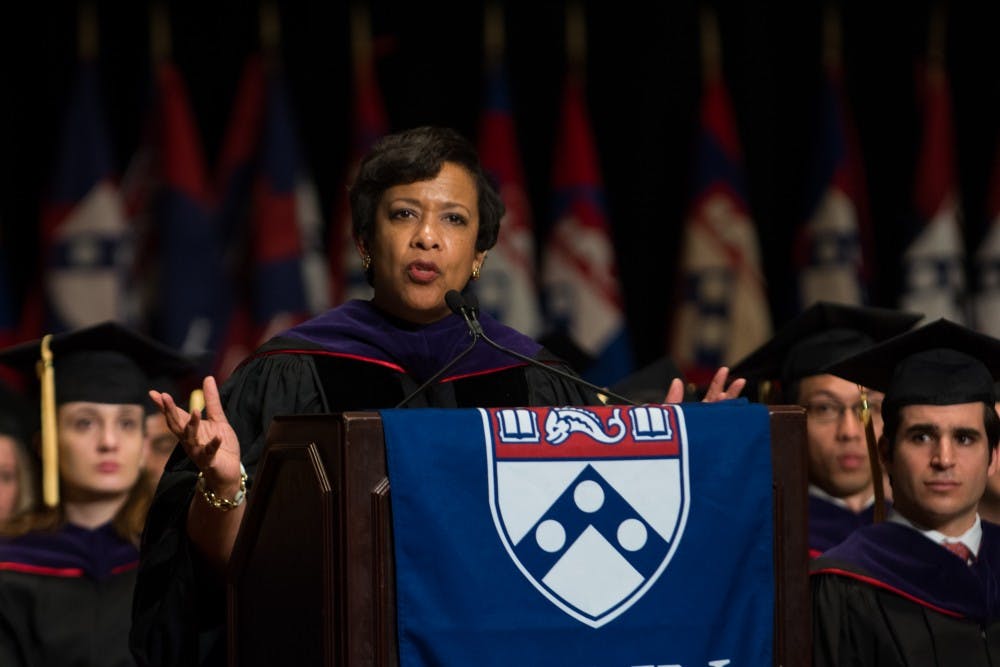
Loretta E. Lynch, Attorney General of the United States, speaks at Penn Law Commencement on May 16.
Credit: Guyrandy Jean-Gilles | Associate Photo EditorAttorney General Loretta Lynch emphasized fighting injustice and promoting inclusivity at the Penn Law Class of 2016 commencement ceremony on May 16.
Her speech was prefaced by remarks from Theodore Ruger, Dean of the Law School, who began the ceremony by saying that graduates had to complete at least 70 hours of pro-bono service, with at least 90 percent of the class completing more.
After Ruger's remarks, 1990 Penn Law graduate and United States Attorney for the Southern District of Florida, Wilfredo Ferrer, also spoke, mentioning that Penn has been a pioneer in this regard. Penn, he said, was one of the first law schools to institute a mandatory amount of pro-bono hours of law service. Ferrer also described his own upbringing, talking about how his parents, both Cuban immigrants, worked to not have to “stand on the sidelines” in America, and how they always told him that “immigrants add immense value to this country.” His statements were met with thunderous applause by the crowd.
Lynch also spoke about her background. She told a story about her grandfather, who grew up and raised her father in rural North Carolina during the days of Jim Crow. Lynch said that “on a dusty road at night, there was no rule of law,” and in North Carolina at this time, “the presence of the law did not always guarantee the presence of justice”.
Lynch went on to describe how her grandfather, a minister, used to help hide African-Americans looking to move away from North Carolina. She described the divide between the laws of the time, which did not truly represent justice, and those seeking justice but at the expense of breaking the law such as her grandfather, who lied in order to protect those fleeing the state.
She used the anecdote as a lesson in how “laws can be used to protect rights, but also to violate them."
“You do not just practice law,” she said, "but you find a way to hold justice in your hand.”
Although Lynch's speech began with a story of how far the laws of the United States have come, it ended with a reminder of how far they still have to go.
One of Lynch’s most recent actions as Attorney General has been to sue North Carolina over HB2, a law mandating that people in public agencies use the bathroom that matches their recorded sex at birth, not their gender identity.
“People face discrimination… even based on things as personal as where they use the restroom,” Lynch said. She urged graduates to remember that even their graduation certificates bear the phrase “laws without morals are in vain,” and to fight for justice in the world as they move forward in their law careers.
Lynch also echoed Dean Ruger’s remarks, emphasizing that expanding access to justice is paramount in the modern age. She reminded graduates of what they should remember going forward, both as lawyers and as citizens of the world.
“The law is truly the instrument of the people,” Lynch said. “What matters are the morals of the people implementing it. Your tenure as students of the law now ends and your time as stewards of justice begins.”
The Daily Pennsylvanian is an independent, student-run newspaper. Please consider making a donation to support the coverage that shapes the University. Your generosity ensures a future of strong journalism at Penn.
DonatePlease note All comments are eligible for publication in The Daily Pennsylvanian.








